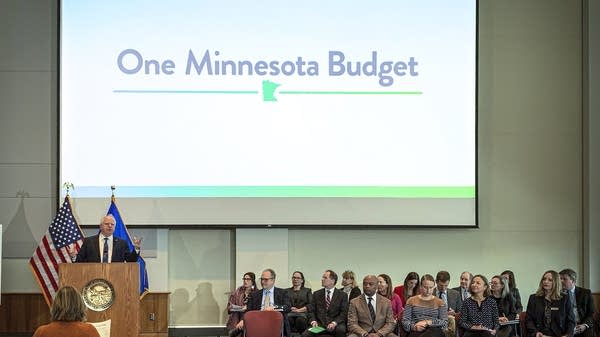Walz proposes checks for up to $2,600 based on income, family size

Go Deeper.
Create an account or log in to save stories.
Like this?
Thanks for liking this story! We have added it to a list of your favorite stories.
Updated 3:15 p.m.
Minnesota families could receive up to $2,600 in rebate checks under a state spending plan that Gov. Tim Walz outlined on Tuesday.
Individuals who make up to $75,000 a year could receive a check of $1,000 each. For married couples, the threshold for a $2,000 rebate check is $150,000. Parents could receive an additional $200 on their rebate check for each child. The maximum benefit is $2,600 for a family.
As many as 2.5 million Minnesota households are expected to receive a check if the plan is adopted.
The governor rolled out the final chapter of his budget proposal, which also called for reducing the state tax on Social Security benefits for about 350,000 recipients and legalizing marijuana for recreational use.
Turn Up Your Support
MPR News helps you turn down the noise and build shared understanding. Turn up your support for this public resource and keep trusted journalism accessible to all.
Walz, a second-term DFLer, said the tax benefits could make a meaningful difference for Minnesota families. And he said it was important to hand some of that funding directly to taxpayers to let them decide how best to spend the money.
“I've made no mistake about it that people can make good decisions for themselves and a portion of this surplus needs to get back into their hands,” Walz said. “That might be the difference between housing for you because it could be first and last month rent. It could be the things you need to do for your children. It could be a vacation, if that's where you're at and your family needs.”
The proposal also included an increase in the state’s capital gains tax, a payroll tax to fund a paid family and medical leave program, and increased vehicle tab fees.
As part of the full two-year budget, Walz proposed:
More than $4.4 billion in extra spending for public schools
Over two years, $1.1 billion for child tax credits
A $300 million plan to support public safety agencies
$670 million to get a paid family and medical leave program off the ground
$458 million to help the state’s energy sector to become carbon-free by 2040
So far Walz’s plan has drawn mixed reviews from members of the DFL-led Legislature. Legislative leaders have supported the effort to roll back the tax on Social Security income for some Minnesotans rather than eliminate it entirely. And they’ve not committed to the plan to issue rebate checks, instead favoring additional tax credits.
DFL leaders at the Capitol applauded the overall package on Tuesday, noting in a news release that it centered on Minnesota values.
“We value great public schools, affordable health care, and an economy that works better for everyone,” House Speaker Melissa Hortman, DFL-Brooklyn Park, said. “I commend the governor for proposing a bold budget with an inspirational vision for our future.”
Republicans have been saying since projections of a $17.6 billion surplus were announced in December that most of the money should go to cutting taxes.
“Huge government growth in agencies, huge government growth in taxation. It’s very very concerning,” Senate Minority Leader Mark Johnson, R- East Grand Forks, said of the Walz Budget.
"If we can't cut taxes now, when can we?” asked House Minority Leader Lisa Demuth, R-Cold Spring, adding that the governor’s proposals on public safety fall short, given concerns about violent crime.

Demuth said she supported the governor’s plan to send Minnesotans checks but said “permanent tax cuts” are what’s needed.
Business and local government groups were also quick to voice frustrations with the budget.
The Minnesota Chamber of Commerce said the state should lower its taxes rather than raising them for some groups.
“Now is the time to make Minnesota more competitive and invest in our economic future by lowering taxes and preventing costly mandates — not proposing a 26 percent increase in government spending and top-in-the-nation taxes, including $1 billion in new payroll taxes, a metro sales area tax increase, a cannabis tax and the highest capital gains tax in the nation,” said Laura Bordelon, the chamber’s senior vice president of advocacy.
The Coalition of Greater Minnesota Cities said the $30 million boost in local government aid proposed by Walz falls short of what they need.
“The $30 million increase doesn’t keep up with inflation,” said coalition president and Thief River Falls mayor Brian Holmer in a statement. “With a record-high surplus, this proposal is disheartening.”
Without more money from the state, Holmer said, local governments will have no choice but to cut services, raise taxes or do both.


